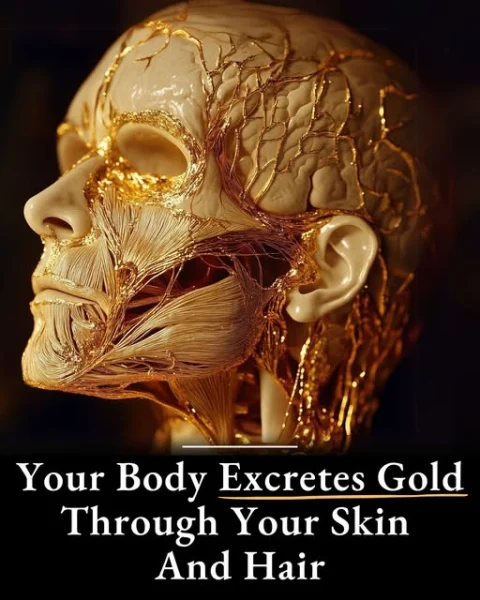Humans have always been curious about the wonders within their bodies, and one of the most fascinating discoveries is the presence of gold in the human body. While no one is likely to become a millionaire from this gold, it remains an interesting feature of human biology. So, does gold really exist in our bodies? And if so, what role does it play in our health?
The amount of gold in the human body is very small, but not nonexistent. According to scientific studies, a human body weighing around 68 kg contains 0.2 milligrams of gold, most of which is found in the blood. Gold does not play an essential biological role, but its presence still piques the curiosity of many. It is one of the trace elements found in the body, along with other trace elements like iron, zinc, and copper. However, what makes gold special is that it is one of the rarest metals and is considered highly valuable on Earth.

Gold in the human body is not a necessary factor for physiological functions. In fact, gold does not perform any significant role in our health. It is primarily excreted from the body through natural processes like sweating, skin cell shedding, and hair loss. This means that every time we sweat or shed skin, a tiny amount of gold is expelled without us noticing. However, even if we could collect this gold, it would not be enough to make us wealthy.
Although gold does not have a biological role, its presence in the body is an interesting detail of biology. Gold is not an essential part of cells or tissues, but it appears as part of a series of trace elements that help the body maintain stable functions. Specifically, gold is primarily found in the blood, where it may reflect the body’s metabolic and biochemical processes.
Recent studies have shown that trace elements like gold can help the body maintain overall health. While gold doesn’t help cure diseases or improve health conditions, the presence of these trace elements is an essential part of the body’s physiology. However, the gold in our bodies does not have any specific role in protecting or curing diseases.
So, how can we explain the presence of gold in the human body? A popular hypothesis is that gold is found in the body through diet, as we absorb minerals from food. Moreover, the amount of gold in the body is not created by a special biological process, but is a result of absorbing rare metals from water, air, and food sources. This could explain why the amount of gold in the body is insignificant and has no clear biological effect.
Although the excretion of gold through sweat and skin cells may seem unimportant, it shows that the human body has the ability to process and eliminate trace elements that we don’t notice. This is an interesting feature of the body’s biological process that scientists are still trying to explain.
In everyday life, we cannot collect gold from our bodies. However, understanding that our bodies expel one of the most precious metals on Earth gives us a fresh perspective on the trace elements in our bodies and the importance of maintaining a balanced diet to keep the body healthy and functioning optimally.


HPX24h > Science > Gold in the Human Body: A Scientific Look at the ‘Hidden Gold’ Inside You
Tagged Articles
Exploring How Microplastics Enter the Body and Affect Health
Your Body Is Not the Same as It Was 10 Minutes Ago: The Continuous Regeneration Process of the Human Body
Top Reads from This Category
Science
Implanting an NFC Chip into the Hand – When Technology and Humans Merge
Science
The Mystery of the Brain Network that Regulates Human Attention Has Been Unveiled
Science
The Science Behind CRISPR: Can Animal Genetic Modification Lead Us to a Better Future?
Science
China’s Hypersonic Jumbo Jet Could Cut Beijing to New York Flight Time to Just 2 Hours
Science
Stem Cell Therapy for Lung Cancer: A New Hope Entering Human Trials
Science
Stem Cells and Gut Cultures: Unlocking New Possibilities for Treating Digestive Disorders
Science
The Science of Measuring Biological Age: New Discoveries About the Aging Process
Discover New Topics
Health
Forgetfulness Can Bring Unexpected Evolutionary Benefits
Animals
Explaining How Mosquitoes Can Fly Through a Rainstorm
Healthy Eating
Types of Fats: Can Fats Be Good for You?
Health
Did You Know? Chronic Stress Can Prevent Your Body from Fully Recovering
Fitness
Effective Workout Tips: The Best Full-Body Exercises for Health
Animals
Ravens Use Gestures to Find Mates: A New Discovery About Their Intelligence
Parenting Tips
How to Talk to Your Child About Smoking Issues
Science
Blood Test: A Breakthrough in Early Detection of Alzheimer’s Disease
Animals
The Secret Behind Turtle Eggs Hatching at the Same Time: A Fascinating Reason
Healthy Eating
Robert F. Kennedy Jr.: “We Are Being Poisoned Without Knowing It”
Health
Fruits That Can Spike Blood Sugar Levels: Be Cautious
Healthy Eating
Vegan Keto Diet: Everything You Need To Know
Space
Exploring Saturn’s Moon Phoebe: Planet-Like Features and Characteristics